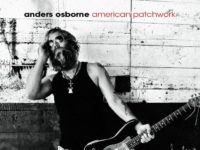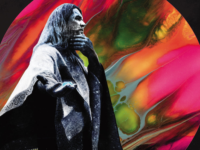Wisdom flows like the Mississippi River through James McMurtry’s new album, The Horses and the Hounds. This is North Star Americana stuff.
First, a comment on the brilliant song “Operation Never Mind,” which is a brutal comment on current war culture. There are so many razor blade confessions that juxtapose “the country boys who do the fighting” while “we just go about our business” and “drop the kids off at the mall.” George W. Bush, in the midst of 9/11 tragedy told all Americans “to shop.” So that’s what we do — while “a KBR man cooks a T-bone” and “a soldier’s chocking down an MRE.” This is Bob Dylan without the metaphor.
That said, the first two songs on McMurtry’s The Horses and the Hounds are wonderful stream-of-consciousness musings that elevate the common observation into sublime revelation. The great John Prine was the master of the genre. And James McMurtry continues in that tradition and chronicles songs that “walk between the raindrops dry as a bone.”
The first track, “Canola Fields,” ruminates while driving through Southern Alberta. The yellow fields conjure disjointed memory connections worthy of a Faulkner Compson family character. Then, “If It Don’t Bleed” is an uptempo comfortable shoe of a song that, once again, confesses a dart board of really decent saddle-worn spirituality with the words, “It don’t matter if you don’t look like me; I can share my bread and wine.”
The songs of The Horses and The Hounds are filled with characters who pray tough confessions — people, yet, who have no hope of salvation. Sure, as James McMurtry once sang, “I’m washing down my blood-pressure pill down with Red Bull.” Now, to get all literary (because this is a very literary folk album!), Nathanial Hawthorne’s The Scarlet Letter was based on the symbolic child Pearl, born out of wedlock and quite uncontrollable – because she represents the truth. But a “pearl” is the product of sand which irritates the mollusk.
Yeah, this is music that irritates a melody, and yet it unravels a beautiful pathos of an autumnal reflection at “a late September wedding with October breathing down our necks.” Indeed, we still need to say, even after all these John Prine years, “Hello in there, hello” to “me and Linda.”
This music can get rock tough: McMurtry’s title song rocks with ancient rock ‘n’ roll that is carved on a moss-covered tombstone — with a bit of Neil Young and Crazy Horse (or, perhaps Buffalo Springfield) open-throttled full-blooded apocalyptic vibe (with great backing vocals!). “The Horses and the Hounds” is a mythical American template: The speaker is chased by some Robert Johnson-inspired “hellhound on my trail.” And the only choice is to face that darkness — because, as (the great) Gordon Lightfoot once sang, “It’s too late for prayin’.”
And then the off-hand observation of “Ft. Walton Wake-Up Call” is a casino-spun tune that evokes Dylan (with the metaphor) that confesses “I keep losing my glasses.” Perhaps, that’s a modern American problem. It certainly explains a lot of strange stuff going on in our land of the free and the brave. And “Vaquero,” too, paints a dark picture of the oft-romanticized cowboy myth. Then, “What’s the Matter” ups the melodic rock pulse, while contemplating the pitfalls of a road musician’s family life. Bruce Springsteen got it right: “Baby, we were born to run.”
That (again) said, there’s other folk songs that sing to the human heart. “Jackie” is a waltz-time song with a tragic unexplained car crash ending questioning why some things just “ended that bad.” As my buddy Kilda Defnut often says, “Sometimes, in folk music, things just ended that bad.” Then, “Decent Man” is absolutely barbed-wire music.
Quite frankly, it’s sort of like a modern American song with a root touching the tragic murder ballads of merry old England. It’s friend against friend (with a lot of weird psychological muddled insight!) when, as Richard Thompson and Fairport Convention once noted, “Now the right thing’s the wrong thing.” This is “dark end of the street” folky stuff.
The final song, “Blueberry Winter,” captures an intense human moment. It’s a conversation with someone who will “play with that loose strand of hair.” In an interview, James McMurtry said this track is “about talking somebody off the ledge.” Perhaps, with a tough baptism, and with prayers without any hope of salvation, that’s the best gospel we can quote while “chasing down a blood-pressure pill with Red Bull” – and, by the way, when we’re all living way “too long in the wasteland.”
- Nektar – ‘Journey to the Other Side: Live at the Dunellen Theater’ (2024) - April 8, 2024
- Emerson Lake and Powell – ‘The Complete Collection’ (2024) - February 23, 2024
- Madlen Keys – ‘Event Horizon’ (2023) - December 15, 2023




